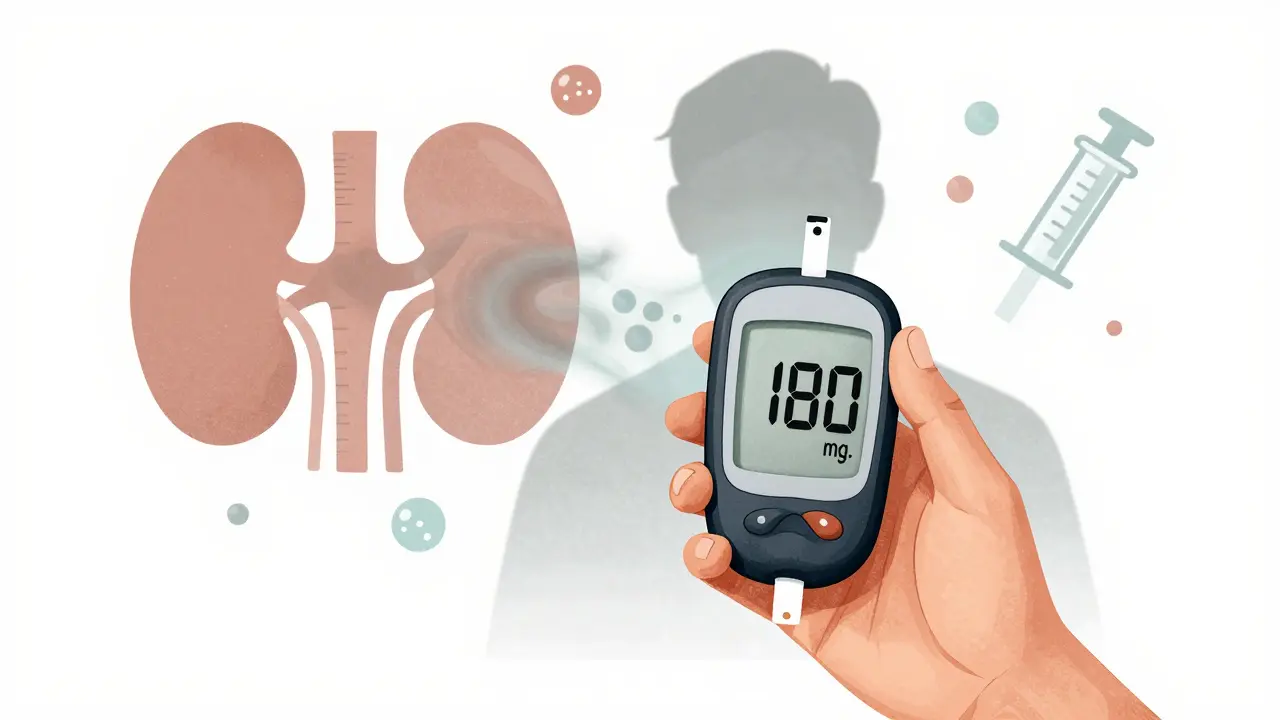SGLT2 Inhibitors – What They Are and Why They Matter
When talking about SGLT2 inhibitors, a class of oral medications that block the sodium‑glucose co‑transporter‑2 in the kidney, reducing glucose reabsorption and lowering blood sugar levels. Also known as Sodium‑glucose co‑transporter‑2 inhibitors, they have become a go‑to option for many patients. In plain terms, they help the body dump excess sugar in the urine, which not only improves glycemic control but also brings extra health perks.
One of the biggest groups that benefit from this drug class is people with type 2 diabetes, a chronic condition where the body either resists insulin or doesn't produce enough. For them, SGLT2 inhibitors do more than just trim numbers on a glucose meter; they cut the risk of heart attacks and strokes, linking the medication directly to cardiovascular protection, a reduction in major adverse cardiovascular events. The heart‑saving effect is especially important because cardiovascular disease is the leading cause of death in diabetic patients.
Beyond blood sugar and heart health, these drugs have a surprising side effect: they can aid weight loss, usually a modest 2‑5 kilograms over several months. The calorie loss comes from the expelled glucose, which means fewer calories stay in the body. For many patients, that extra pounds shed translates into better insulin sensitivity and lower blood pressure, creating a virtuous cycle of health improvements.
Kidney function is another arena where SGLT2 inhibitors shine. They slow the progression of chronic kidney disease, a condition where the kidneys lose filtering ability over time. By lowering intraglomerular pressure and reducing hyperfiltration, these meds protect the nephrons from damage. The result is a slower decline in estimated glomerular filtration rate (eGFR), which can delay the need for dialysis or transplant.
Practical Takeaways for Everyday Use
Putting it all together, SGLT2 inhibitors operate at the crossroads of three major health goals: controlling glucose, protecting the heart, and preserving kidney health. That triple benefit makes them a compelling choice for patients who have more than just high blood sugar to worry about. Doctors often prescribe them alongside metformin or insulin, creating a layered approach that tackles the disease from multiple angles.
Side effects are generally mild but worth knowing. The most common are genital yeast infections and urinary tract infections, both tied to the increased sugar in the urine. Staying hydrated, practicing good hygiene, and reporting symptoms early can keep these issues in check. Rarely, people may experience a drop in blood pressure, especially if they’re also on diuretics.
Another practical point: dosage matters. Most SGLT2 inhibitors come in once‑daily tablets, with doses adjusted based on kidney function. If a patient’s eGFR falls below a certain threshold, the drug may need to be reduced or stopped. Regular lab work every three to six months helps ensure the therapy remains safe and effective.
Patients often ask whether lifestyle changes still matter. The answer is a resounding yes. Diet, exercise, and weight management amplify the drug’s benefits and keep blood sugar stable. Think of SGLT2 inhibitors as a catalyst that works best when paired with a healthy routine.
Insurance coverage can be a hurdle, but many plans now list these medications as covered for diabetes and heart failure. Checking with a pharmacy benefit manager or using discount programs can lower out‑of‑pocket costs, making the therapy accessible to more people.
Research doesn’t stop at diabetes. Ongoing trials explore SGLT2 inhibitors for heart failure with preserved ejection fraction, non‑alcoholic fatty liver disease, and even obesity without diabetes. Early results are promising, suggesting the drug class might have even broader applications in the near future.
In short, if you’re dealing with high blood sugar, heart risk, or kidney concerns, SGLT2 inhibitors offer a multi‑pronged solution that goes beyond simple glucose control. They’re backed by solid clinical data, have manageable side effects, and fit easily into most treatment plans.
Below you’ll find a curated selection of articles that dive deeper into specific aspects of SGLT2 inhibitors—how they compare to other diabetes meds, real‑world patient experiences, dosing tips, and the latest research updates. Whether you’re a patient, caregiver, or healthcare professional, these posts give you actionable insights you can use right away.

- Feb 8, 2026
- Posted by Cillian Osterfield
SGLT2 Inhibitors and Diabetic Ketoacidosis: What You Need to Know About the Hidden Risk
SGLT2 inhibitors help manage type 2 diabetes but carry a hidden risk: euglycemic diabetic ketoacidosis (euDKA), where dangerous ketone buildup occurs even with normal blood sugar. Learn the symptoms, who’s at risk, and how to stay safe.

- Oct 11, 2025
- Posted by Cillian Osterfield
Dapasmart vs Other Diabetes Drugs: A Detailed Comparison
A clear, side‑by‑side comparison of Dapasmart (dapagliflozin) with other diabetes drugs, covering efficacy, heart and kidney benefits, side effects, cost and best‑fit scenarios.
Categories
- Health and Wellness (72)
- Medications (71)
- Health and Medicine (28)
- Pharmacy Services (12)
- Mental Health (9)
- Health and Career (2)
- Medical Research (2)
- Business and Finance (2)
- Health Information (2)
©2026 heydoctor.su. All rights reserved




